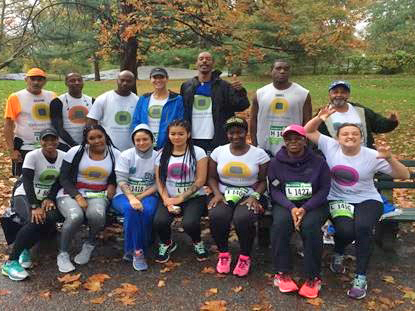
Flashback Friday to our 2018 running team!
Due to the increase in the infection rate from Covid-19 citywide, we continue to adapt our workout schedule to reduce the possibility of spreading the virus. This Saturday, January 30th, the team will meet on the grounds of the GRCR facility (13 Hell Gate Circle, Wards Island). The workout session will begin at 9 am, weather permitting, and then the team will head out going West towards the 103rd Street bridge to complete a 4-mile loop on the Randall’s Island pathway. The weather forecast reports temperatures in the low 30s with sunny skies; please, dress accordingly, covering all your extremities: hands, head, and ears. All participants are required to follow the CDC guidelines at all times, wearing face masks at all times and adhering to social distance protocols.
Why Running Is Good for Addiction Recovery
By Candice Rasa, LCSW
Besides being a highly rewarding exercise that strengthens the heart and respiratory system, running brings unique physical and mental benefits to those struggling with excessive stress—and with drug addiction.
Most people who struggle with addiction are looking for an easy means of relieving pain or stress. By providing an alternate, healthier method of relief and mood improvement, running and other aerobic exercise helps suppress drug cravings and reduce temptations to relapse. It also can help remedy other health problems caused by addiction.
Let’s take a closer look at why running is good for addiction recovery.
The Positive Effects Running Can Have on Addiction Recovery
Many physical benefits of running are obtainable in a short period of time, such as increased stamina, weight loss, and stronger heart and lungs. However, the first improvements noticed are typically mental. These include:
- A strong sense of increased positive feelings. Known as a “runner’s high” vigorous exercise increases the brain’s endorphin and dopamine levels, which makes you feel better.
- Reduced everyday depression. (In cases of addiction, depression is typically a factor and often an actual accompanying illness.)
- Reduced cravings for unhealthy foods and drugs.
- Increased sense of being in control, which reduces the chronic sense of helplessness and frustration common to most addicts.
- Clearer thinking.
- Higher self-esteem, confidence, and sense of achievement.
- Greater hope for the future.
- Increased learning ability.
- Lower relapse rates in addiction recovery.
Click here to read more.
Coach Andre’s tips:
There is another way joining a running group can benefit people in recovery. Being part of a group means more support, which reduces the likelihood of relapse. The running community is and can be another positive recovery network, provided that the person in recovery remembers the concept “What I can’t do alone, we can do together.” People in early recovery benefit from engaging in hobbies, like exercising, playing sports, doing arts and crafts, reading a book, hiking, fishing, roller skating, biking, or even simply sightseeing. These are things that will help occupy their time while giving them a feeling of self-dignity and self-worth. Quality of life can be obtained for the people in recovery when they choose to participate in meaningful activities.

